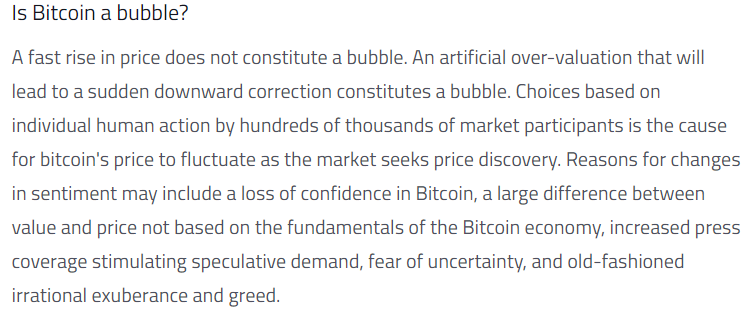
Author: Jonathan Harrington
It is not surprising that Bitcoin has captivated people’s attention over the last year given its dramatic increase in price and abundant press coverage. You can’t go a day without hearing someone start a sentence with “The price of Bitcoin…” or “An investment in Bitcoin in 2010 would be worth…”.
It is puzzling to hear Bitcoin framed as an investment. Wasn’t Bitcoin started as an easier way to exchange payments between two parties? Shouldn’t you want a currency to be fairly stable in value so you can be certain that when you accept a payment the value will not fluctuate wildly while you hold it until you need to use it for spending?
If you visit the bitcoin.org website and read some of the information that they have listed as Bitcoin’s “innovations” you may leave thinking “that sounds a lot like Venmo .” Have the problems that Bitcoin initially tried to address in 2009 (easy, secure way to make fast payments of any size around the world) already been solved?
Supporters of Bitcoin like Fidelity Digital Assets infer that price volatility in Bitcoin is normal because of supply and demand issues and that Bitcoin is an “ aspirational store of value ” (meaning can’t be relied upon today). Doesn’t that defeat the purpose of its use as a means for payment?
Perhaps there are opportunities to improve the efficiency of making payments internationally but why has the talk turned to Bitcoin as an investment or asset class?
Warren Buffett’s Take
During the Berkshire Hathaway Annual Meeting in 2018 Warren Buffett said : “In terms of cryptocurrencies, generally, I can say with almost certainty that they will come to a bad ending.” He later referred to Bitcoin as “rat poison squared”.
I don’t think that Mr. Buffet is implying that the underlying technology of Bitcoin and other cryptocurrencies (blockchain) is awful or will never work. I believe the point he is trying to make is that Bitcoin has turned into something that it was never intended to be.
The Bitcoin Bubble
Does it make sense that Bitcoin, which was started as a digital currency in 2010 when the value of each coin was pennies, would now be worth more than $57,000 for one coin (as of 4/8/2021)? The bitcoin.org website has, under FAQs , a question Is Bitcoin a bubble? The listed answer (below) seems to provide a close approximation to the phenomena that we are witnessing concerning Bitcoin today and gives a lot of credence to those that believe Bitcoin has failed as a means of payment.
Institutional Acceptance
In December of last year Mass Mutual invested $100 million of their general-purpose fund in Bitcoin, along with a $5 million equity investment in the NYDIG , a cryptocurrency trading platform for institutional investors. Then in February of 2021 Tesla bought $1.5 billion in Bitcoin and announced they will accept it as a means of payment.
Supporters of Bitcoin use these as examples of the institutional legitimization of Bitcoin as a store of value or investment (which is very different than being used as a currency). Doesn’t this mean that Bitcoin is legitimate? No, even large corporations can be caught up in a speculative bubble or try to feed off the hysteria surrounding Bitcoin to try and make money from less educated investors who pile in before the bubble bursts.
Ric Edelman
The founder and chairman of one of the largest Registered Investment Advisory (RIA) firms in the country, Ric Edelman , has leaned big into Bitcoin. At a technology conference in 2020, he tried to make the case that financial advisors should consider using Bitcoin as part of their client portfolios citing its high volatility and massive potential for returns. But he also admitted that investors should be prepared for a possible 100% loss. That does not seem like a prudent investment vehicle for any clients that I know.
It should be noted that Ric Edelman is an investor in Bitwise which is a firm attempting to create a publicly-traded cryptocurrency index ETF. He is also the chair of the RIA Digital Assets Council , a group dedicated to encouraging more financial advisors towards using cryptocurrencies in their client portfolios.
Tax Consequences
On the 2020 1040 Federal Tax Return, the IRS included a box check that asks if “at any time during 2020, did you receive, sell, send, exchange, or otherwise acquire any financial interest in any virtual currency” (under penalty of perjury). It seems that the IRS is interested in how many owners of digital/crypto/virtual currencies are meeting their obligation to report transactions in digital currencies as short or long-term capital gains. I wonder how many know of this requirement. It seems like a substantial administrative burden to undertake if you have to keep a record of every digital currency transaction for tax purposes. I would think this would be a major detractor for the case to use these as a means of payment.
Regulatory Oversight
On March 1st New York State Attorney General Letitia James warned New York investors that:
“Trading in the current market exposes investors to risks, such as wild price swings, conflicts of interest among trading platform operators, and increased chances of market manipulation. Further, even ‘legitimate’ investments in virtual assets are subject to speculative bubbles, and the continued tragedy of the coronavirus disease 2019 (COVID-19) public health crisis has put law enforcement on high alert for scammers and unscrupulous industry players using deceptive tactics to gain confidence with false promises of high or even guaranteed returns. Additionally, given an individual’s ability to hide their true identity when trading virtual currency, many criminals use cryptocurrencies in their schemes, including for money laundering, human trafficking, blackmail, illicit financing, and tax evasion.”
That statement is about the biggest red flag I can imagine for wanting to avoid Bitcoin and other digital currencies as an investment.
What Else
Other arguments against Bitcoin include:
- It has no intrinsic value and doesn’t produce anything;
- It has failed as a means of payment;
- There are no barriers to entry for competitors;
- It is not backed by any government or pegged to a stable currency;
- It is primarily used for illicit activities;
- It’s subject to massive manipulation;
- It is completely unregulated;
- It uses a staggering amount of energy consumption to function;
- Users must pay high transaction costs to convert bitcoins into usable currency;
- Digital currency exchanges can be hacked (hundreds of thousands of bitcoins were lost/stolen in the 2014 Mt. Gox debacle);
- If you lose the key to your Bitcoin wallet, your Bitcoins are lost forever.
Of course, Bitcoin proponents have counterpoints to refute all of these arguments. Any one of these should make investors think twice about considering Bitcoin (or any other digital currency) as an investment.
Central Bank Digital Currency (CBDC)
Digital currencies will likely have a place in the world if they can be pegged to the U.S. dollar or be issued by central banks. In February, the U.S. Federal Reserve said the Fed will study if a Central Bank Digital Currency (CBDC) makes sense. The conclusion of the article was that the U.S. has a lot of work to do before we can even get to the starting line of offering a CBDC. If other developed nations do the same thing and create their own CBDCs, this could wipe out the need or use for all of the digital currencies in existence today.
A Well Thought Out Plan
Fear of Missing Out (FOMO) with investing is pervasive. News stories about Bitcoin millionaires may entice investors to want to try their hand at investing in Bitcoin and other digital currencies. It is always important to remember to focus on your financial goals and how best to achieve them. Chasing the chance of high returns in speculative financial instruments is not part of a well-thought-out financial plan. Don’t get yourself involved in the self-perpetuating feedback loop of uninformed investors piling into digital currencies trying to get rich quickly.
Final Thought
If you haven’t listened to the Missing Cryptoqueen Podcast from the BBC, it is worth a listen. Part of the 8-part series is about OneCoin, a Ponzi scheme that was built off of the frenzy of cryptocurrencies. The Bitcoin and OneCoin stories are not the same but are alarmingly similar in terms of the possibility of losing money.
Jonathan Harrington, CFP® is an advisor at Milestone Financial Planning, LLC, a fee-only financial planning firm in Bedford NH. Milestone works with clients on a long-term, ongoing basis. Our fees are based on the assets that we manage and may include an annual financial planning subscription fee. Clients receive financial planning, tax planning, retirement planning, and investment management services, and have unlimited access to our advisors. We receive no commissions or referral fees. We put our clients’ interests first. If you need assistance with your investments or financial planning, please reach out to one of our fee-only advisors .




